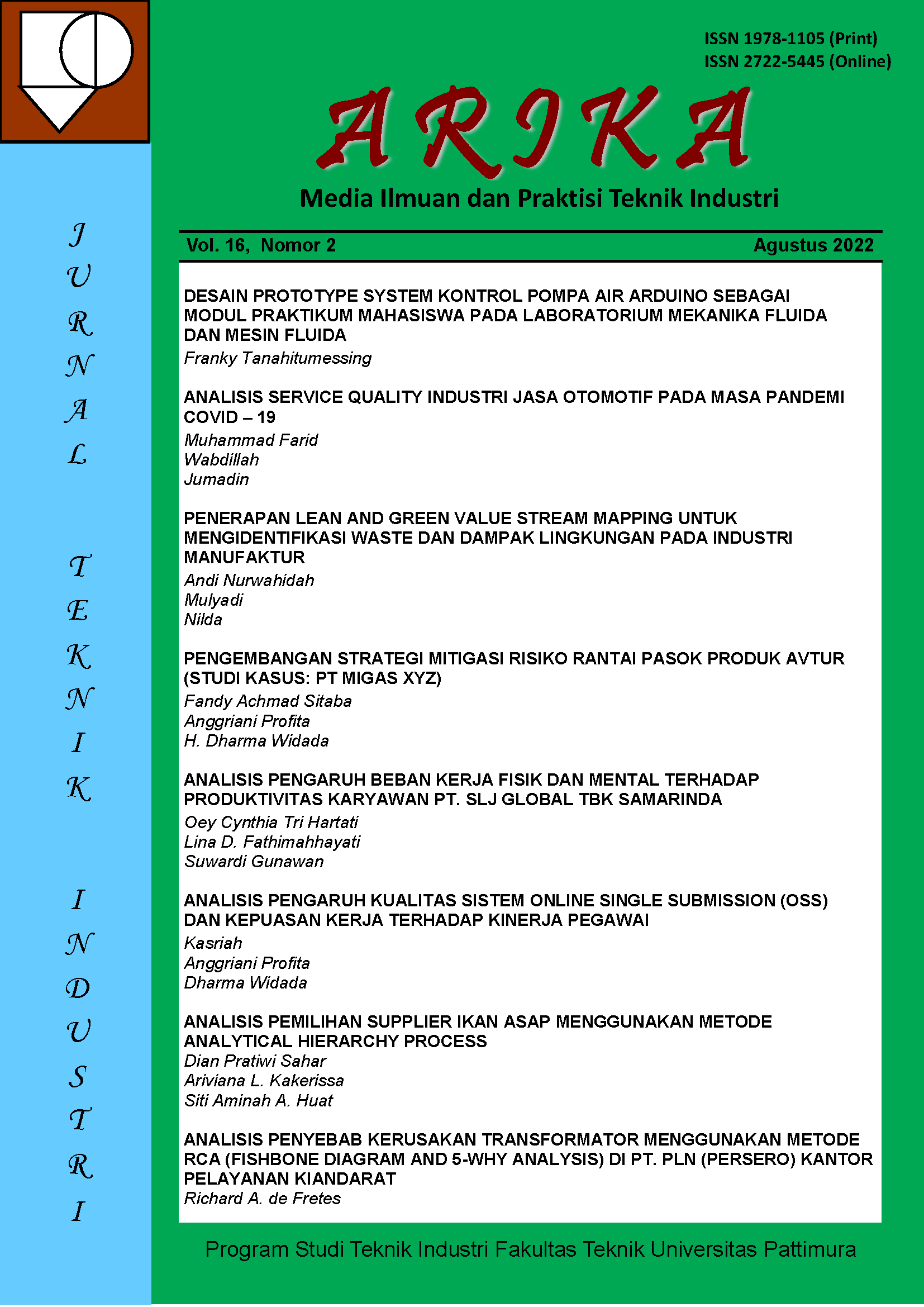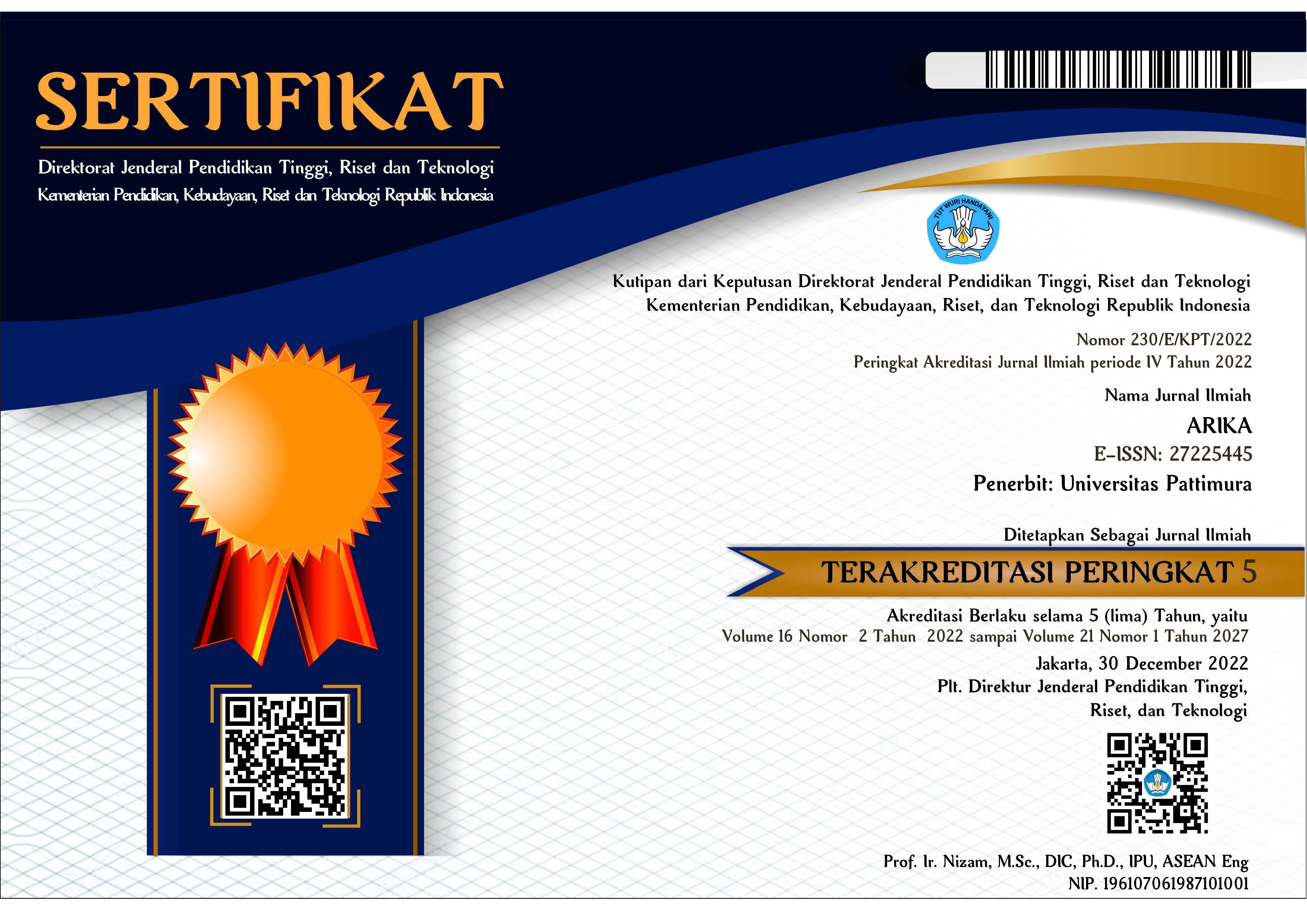Analisis Service Quality Industri Jasa Otomotif pada Masa Pandemi Covid – 19
Abstract
Penelitian Analisis Service Quality Industri Jasa Otomotif bertujuan mengidentifikasi service quality industri jasa otomotif dan menganalisis pengaruh kualitas jasa terhadap kepuasan konsumen pada industri jasa otomotif di masa pandemi covid-19. Penelitian ini menggunakan lima variabel manifes yaitu accesibility, tangibility, responsivenes, competence dan reliability. Berdasarkan analisis deskriptif diperoleh bahwa implementasi lima variabel ini pada industri jasa otomotif di masa pandemi covid-19 telah terlaksana dengan baik. Hasil analisis regresi menunjukkan bahwa (1)Terdapat pengaruh yang signifikan antara accesibility terhadap service quality dengan nilai rhitung 0,691, dan nilai sig 0,000, (2) Terdapat pengaruh yang signifikan antara tangibility terhadap service quality dengan nilai rhitung 0,778 dan nilai sig 0,000, (3) Terdapat pengaruh yang signifikan antara responsiveness terhadap service quality dengan nilai rhitung 0,894 dan nilai sig 0,000, (4) Terdapat pengaruh yang signifikan antara competence terhadap service quality dengan nilai rhitung 0,854 dan nilai sig 0,000, (5)Terdapat pengaruh yang signifikan antara reliability terhadap service quality dengan nilai rhitung 0,747 dan nilai sig 0,000. Hasil uji regresi terkait analisis hubungan variabel service quality dengan variabel customer satisfaction maka dapat disimpulkan bahwa terdapat pengaruh yang signifikan antara service quality terhadap customer satisfaction dengan nilai rhitung 0,747 dan nilai sig 0,000
Downloads
References
Berndt, A., 2009, Investigating Service Quality Dimensions In South African Motor Vehicle Servicing, African Journal of Marketing Management, 1 (1), 1-9
Bojanic, D., dan Rosen, D., 1994, Measuring Service Quality In RestaurantL am Application of The SERVQUAL Instrument, Hospitality Research Journal, 18 (1), 3-14
Bolton, R.N. dan Drew, J.H., 1991, A Multistage Model of Consumer Assessment of Services Quality and Value, Journal of Consumer RESEARCH, 17, 375-384.
Castel, D., 2001, A Sustainability Vision for the Automotive Services Industry, Prepared for Oregon DEQ, USEPA Region X Office Seattle, Washington.
Connor, B., 2006, What Is Your New Business Model, Motor, February, 55-58.
Confederation of India Industry, 2008, Skill Gaps in Indian Automotive Service Industry Sector, CII Report for Auto Serv 2008, India’s Focused Exhibition on Automotive Care, 7 – 9 November, Chennai, India.
Dabholkar, P.A., Shepherd, C.D. and Thorpe, D.I., 2000, A Comprehensive Framework For service Quality: an Investigation of Critical Conceptual and Measurements Issues Through a Longitudinal Study, Journal of Retailing, 76 (2), 131-139
Darastemi, A.Y. dan Jahromi, A.E., 2009, Measuring Customer Satisfaction Using a Fuzzy Inference System, Journal of Applied Science, 9 (3), 469 - 478
Farid, M., 2010, Pengembangan Model Service Quality pada Industri Otomotif, Tesis, Program Studi Teknik dan Manajemen Industri. Institut Teknologi Bandung
Farid, M. dan Wiratmadja, I.I., 2011. Pengembangan Model Service Quality pada Industri Otomotif, Prosiding Seminar Nasional Teknik Industri & Kongres BKSTI, 5-6 Oktober 2011, Medan, Indonesia.
Getty, J.M. dan Getty, R.L., 2003, Lodging Quality Index (LQI) Assessing Customer’s Perceptions of Quality Delivery, International Journal of Contemporary Hospitality Management, 15 (2), 94 - 104
Gronroos, C., 2000, Service Management and Marketing; A Customer Relationship Management Approach, Second Edition, John Wiley &Sons, New York.
Lamb, Charles, Joseph H., dan Daniel, M.C., 2001, Marketing, Edisi ke 5, Alih Bahasa edisi Indonesia oleh David Ocatavia, Salemba Empat, Jakarta.
Martin, M. J. C., 1994, Managing Innovation and Entrepreneurship in Technology-Based Firms, John Wiley &Sons, INC, New York.
Miguel P. A.C., Da Silva MT., Chiosini, E. L., dan Schutzer, K., 2005, Assessment of Service Quality Dimensions: a Study in a Vehicle Repair Service Chain, http://www.poms.org/conferences/cso2007/talks/36.pdf
Olorunniwo, F., dan Hsu, M.K. 2006, A Tipologi Analysis of Service Quality, Customer Satisfaction and Behaviorial in The Service Factory , Managing Service Quality, 16 (2), 106 – 123.
Parasuraman, A., Zeithaml, V.A., Berry L.L., 1985, A Conceptual Model of Service Quality and Its Implication For Future Research, Journal of Marketing, 49 (4), 41-50.
Sakina, L., 2003, Identifikasi Bariabel Kualitas Pelayanan Bengkel untuk Memperbaiki Kualitas Jasa Bengkel Mobil, Tesis, Program Studi Teknik dan Manajemen Industri. Institut Teknologi Bandung.
Schmenner, R.W., 2004, Service Business and Productivity, Decision Sciences, 35 (3), 333-347
Sekaran, 2003, Research Methods For Business, Edisi ke 4, Alih Bahasa Indonesia: Kwan Men Yon, Salemba Empat, Jakarta
Sugiyono, 2008, Statistika untuk Penelitian, Alfabeta, Bandung.
Triatmono, 2021, Data Penjualan Mobil Tahun 2010-2021,https://triatmono.info/data-penjualan-tahun-2012/data-penjualan-mobil-2017/
Wang, C-N., Day, J-D., & Farid, M., 2019. Service Innovation Model of the Automobile Service Industry, Applied Sciences,9 (12), 2403.
Zeithaml, V.A., dan Bitner, M.J., 2000, Service Marketing; Integrating CustomerFocus Across The Firm, Irwin McGraw-Hill, New York. http://www.auto2000.co.id/page/info_bengkel_auto2000.aspx Diakses tanggal 17 April 2021.
Copyright (c) 2022 Muhammad Farid, Wabdillah Wabdillah, Jumadin Jumadin

This work is licensed under a Creative Commons Attribution-ShareAlike 4.0 International License.
An author who publishes in the ARIKA Jurnal agrees to the following terms:
- The author retains the copyright and grants ARIKA journal the right of first publication of the work simultaneously licensed under the Creative Commons Attribution-ShareAlike 4.0 License that allows others to share the work with an acknowledgment of the work's authorship and initial publication in this journal.
- The author is able to enter into separate, additional contractual arrangements for the non-exclusive distribution of the journal's published version of the work (e.g., post it to an institutional repository or publish it in a book) with the acknowledgment of its initial publication in this journal.
- The author is permitted and encouraged to post his/her work online (e.g., in institutional repositories or on their website) prior to and during the submission process, as it can lead to productive exchanges, as well as earlier and greater citation of the published work (See The Effect of Open Access).










